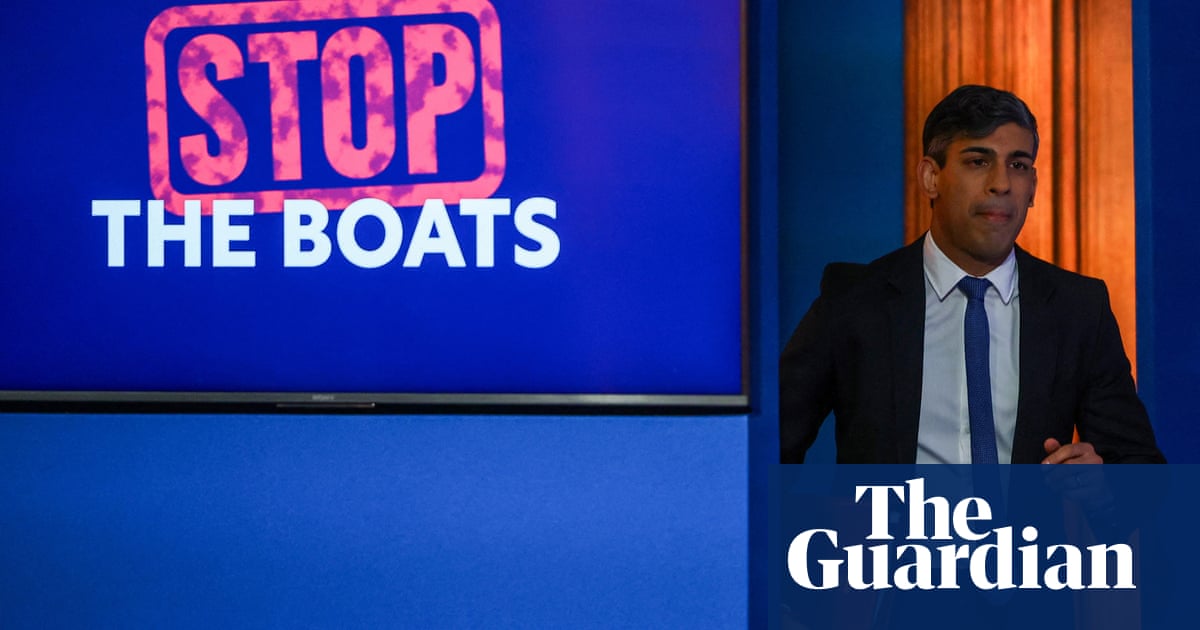
Good morning. After two years, three prime ministers, four (or five) home secretaries, one cancelled flight and about 75,000 more people crossing the Channel in small boats, the government finally passed its Safety of Rwanda bill late last night. Anyone reaching for a symbol of how dismal the whole process has been might have found it at 9.39pm, when a power cut plunged the House of Lords into darkness. Maybe Rishi Sunak took out his frustrations with peers on the fuse box.
The endless Westminster fight over the policy has somewhat obscured the more fundamental questions of whether it will actually achieve what it promises, and reduce the number of people making the crossing. Even now it has passed, we may still be months away from knowing the answer. Charities described it as “shameful” and “Orwellian”; Sunak proclaimed it as “not just a step forward but a fundamental change in the global equation on migration”. Meanwhile, another £50m will be sent to the Rwandan government now that the bill is becoming law, taking the total cost to £290m before a single flight has taken off.
For Sunak, the Rwanda policy is as much political dividing line as serious policy initiative – and so he may view events of the last 24 hours as a useful tool for the coming election campaign. Today’s newsletter explains what the votes were about, how the government prevailed, and what happens next. Here are the headlines.
Five big stories
-
Policing | The commissioner of the Metropolitan police has praised the “professional” conduct of the sergeant who stopped an antisemitism campaigner at a pro-Palestinian march and warned that officers at other protests had been “set up” by activists. Mark Rowley’s intervention came after footage emerged of the officer referring to Gideon Falter as “openly Jewish” during a lengthy exchange in which he offered to escort Falter away from the demonstration.
-
Media | The newsreader Huw Edwards has resigned and left the BBC. A BBC spokesperson said that Edwards, who was suspended last year over allegations he received inappropriate images from a younger person and gave them money, had made the decision “on the basis of medical advice from his doctors”.
-
UK news | Lucy Letby has renewed her appeal against her convictions for murdering seven babies and attempting to murder six others at the Countess of Chester hospital. The former neonatal nurse is serving 14 whole-life prison terms after being found guilty of the offences following a 10-month trial at Manchester crown court last year.
-
Espionage | A parliamentary researcher arrested last year on suspicion of spying for China has been charged along with another man with providing prejudicial information to a foreign state. Christopher Cash, 29, is to appear in court on Friday after he and Christopher Berry, 32, were charged under the Official Secrets Act.
-
US politics | Donald Trump “orchestrated a criminal scheme to corrupt the 2016 presidential election” to cover up an alleged affair with the adult film star Stormy Daniels, prosecutors at the former president’s criminal trial said on Monday. After opening statements from both sides, the trial also heard from its first witness, David Pecker, the former publisher of the National Enquirer.
In depth: ‘Perhaps if the government have made more concessions we wouldn’t have to wait so long’
“Enough is enough,” Rishi Sunak said at his press conference yesterday. “No more prevarication, no more delay. Parliament will sit there tonight and vote no matter how late it goes. No ifs, no buts.”
Now that the bill has passed, Sunak can declare victory, at least on the legislative piece of this problem. But the procedural question is only a step towards the Rwanda flights getting in the air – and even if they do, their prospects of solving the crisis in the Channel are heavily contested. Here’s what you need to know.
What issues were settled yesterday?
The initial 10 amendments from the House of Lords had already been whittled down to two – measures which crossbench peer Alex Carlile yesterday told the BBC would be enough to “maintain our legal standards in this country” and make the bill’s progress acceptable.
Although he and many others oppose the principle of the plan more generally, they also grudgingly accept the view put forward in the Commons by former justice secretary Robert Buckland, the only Conservative MP to rebel against the government. In the end, Buckland said, “the unelected house does have to cede authority to the elected house” – although he also said “perhaps if the government have made more concessions we wouldn’t have to wait so long”.
The first amendment, brought by crossbencher David Hope, was an attempt to strengthen the safeguards around the bill’s declaration that Rwanda is a safe country – by appointing the existing monitoring committee, appointed by the British and Rwandan governments, to certify that it is safe and report back to ministers. It said that if the committee found that Rwanda was failing to meet its obligations under the treaty underpinning the plan, it could no longer be treated as a safe place to send refugees – meaning that flights should stop.
The second amendment, tabled by Labour peer Des Browne, said that those who have served the British army “in an exposed or meaningful manner” should be excluded from eligibility for removal. Crucially, that would exempt Afghans who worked alongside British troops there, including interpreters, from being put on Rwanda flights.
How were the votes decided?
When the two houses disagree on aspects of a bill, it can be sent back and forth between them in a process known as ping pong, giving each the chance to respond to changes proposed by the other. The Lords are typically reluctant to continuously defy the will of the elected chamber, and so limit themselves to a couple of rounds of revisions.
It is a measure of the strength of feeling on this issue that the bill was thrown back to the Commons four times more after peers passed the initial 10 amendments. At one point yesterday, Carlile compared the government to a mad travel agent.
Browne’s amendment was the first to fall away, after a partial government concession – not that ministers used that word. The government spokesperson in the Lords, Andrew Sharpe, said that anyone already in the UK who is eligible for the settlement scheme for Afghans would not be sent to Rwanda. Although some pointed out that this was a meaningless concession for those who make the journey in the future, and the SNP’s Alison Thewliss compared the offer to “magic beans”, it was enough for Browne to withdraw.
Shortly after 11pm, after MPs once more rejected the more fundamental amendment about checks on the safety of Rwanda, sources in the Lords said that peers would not vote against the bill again. The bill finally cleared the upper chamber – with no formal oversight function for the monitoring committee attached – shortly after midnight. It is likely to get royal assent and become law today.
What happens now?
Sunak said yesterday that he expected the first flight to Kigali in “10 to 12 weeks” – which could mean June or July. (An enterprising Daily Express journalist, Steph Spyro, spotted documents left behind after the press conference which said the first charter flight was provisionally scheduled for June, and that commercial flights could take people to Rwanda sooner.)
The Daily Telegraph reported that the government expects about 150 people to be be on the first two or three flights. But Sunak refused to put a number on how many would be removed to Rwanda more widely – and the crucial questions now are whether there are more than a few symbolic flights, and whether whatever numbers do happen are enough to deter people from crossing the Channel on small boats.
Sunak set out a series of measures that he said would facilitate the smooth running of the flights, from increased courtroom and detention capacity to training for 500 officials who will be tasked with escorting people to Rwanda. He also said that charter flights have been booked, and that an airfield is on standby.
All of this, Sunak said, will be a “gamechanger”; this useful thread, from home affairs journalist Lizzie Dearden, points out some of the serious questions over the realities of the timetable and process he set out, from whether asylum seekers will be served with the necessary notices in time to be on flights in the summer to whether Rwanda has the capacity to take more than a handful of them.
There are also likely to be further legal challenges from individual asylum seekers before they are put on flights – and a possibility that pilots could refuse to fly if there is serious disruption on board. If the policy is ultimately found to be unlawful, those taken to Rwanda could then be due significant damages and returned to the UK, immigration solicitor Muhunthan Paramesvaran told the BBC yesterday.
Why did Sunak do it this way?
Given how much time has passed since the government’s “emergency legislation” was introduced in December – and since Boris Johnson first announced the plan way back in April 2022 – it might seem a surreal bit of exam-crisis politics to have the issue finally come to a head in a parliamentary session running late into the night. (Here’s a timeline of the whole tortuous process.)
Sunak says that this was Labour’s fault, and that “if Labour peers had not spent weeks holding up the [Rwanda] bill in the House of Lords to try to block these flights altogether we would have begun this process weeks ago”.
But it’s also true that if cross-benchers had been persuaded of the bill’s wisdom, it would have passed much sooner. (The Tories don’t have a majority in the House of Lords, but they are the largest party, with 277 of 790 peers – although, unlike in the House of Commons, the arithmetic somewhat depends on who bothers to show up.) And peers say that it is the government, not the House of Lords, that has allowed the “ping pong” process to drag on for so long: it could have used exactly the same late night process before Easter.
That raises another possibility: that Sunak decided to bring the matter to a head later so that he might more easily make villains of those who opposed it if the flights still fail – and, perhaps, to ensure that it is not possible to reach a definitive verdict on the scheme’s success before the next election.
after newsletter promotion
That theory only makes sense if the Conservatives have little real faith in the policy’s gamechanging potential – and rather than be accountable for a promise that was broken, prefer to talk to voters about a solution that was thwarted, instead.
What else we’ve been reading
-
Mona Chalabi’s visualisation (above) of how Israeli settler violence in the West Bank is proliferating is eye-opening and distressing. Nimo
-
After Rishi Sunak’s vow to tackle a so-called “sicknote culture”, Frances Ryan writes with precision and fury about how ill and disabled people are treated in the UK, and why they have become the Conservative party’s go-to scapegoats. Archie
-
“Identity tracing” is a completely unregulated sector, there is no qualifications, licenses or scrutiny, yet creditors use investigators to find debtors. Anna Tims spoke to the people who have been misidentified and harassed to pay debts that they never owed. Nimo
-
The actor David Harewood has just become the first person of colour to be president of Rada. In this interview with Steve Rose, he explains why he thinks that’s more than symbolically important – and how his experiences of racism have shaped his career. Archie
-
Bloomberg’s Drake Bennett has written a cracking deep dive (£) into the life of Aleksanteri Kivimäki, a hacker who stands accused of orchestrating the biggest cyberattack in Finnish history, and leaking thousands of people’s psychotherapy notes. Nimo
Sport
Football | Leeds United bolstered their chances of automatic promotion to the Premier League with a thrilling 4-3 win over Middlesbrough. The victory, thanks to two goals from Crysencio Summerville (above) and one each for Patrick Bamford and Wilfried Gnonto, puts Leeds back into second place at the expense of Ipswich Town.
Tennis | After another good week for Emma Raducanu, in which she held her own against world No 1 Iga Swiatek in Stuttgart, Tumaini Carayol writes that Raducanu is playing “with a level of freedom and conviction that she has not enjoyed since she won the US Open in 2021”. Now, he writes, she heads to the Madrid Open hoping to “continue the momentum she has started to build at one of the biggest non-slam tournaments in the world”.
Chess | 17-year-old grandmaster Gukesh Dommaraju became the youngest player to win the men’s Candidates chess tournament after a draw against Hikaru Nakamura on a nail-biting final day of the event in Toronto on Sunday.
The front pages
The third edition of the Guardian squeezes in the late-night news from Westminster: “Rwanda bill to become law as peers back down”. The splash is “Met police chief praises conduct of officer in antisemitism row”. “Detentions can start within days under Rwanda law” says the Times, while similarly the Daily Telegraph has “Rwanda migrants to be detained within days” and the Daily Mail goes with “Enough is enough! We’re ready for Rwanda lift-off”. “Rwanda plan won’t work, Tory critics tell Sunak” – that’s the i while the Metro says “PM: we fly in July”. The Financial Times has “FTSE 100 closes at record high after weakened sterling boosts valuations” while the Daily Express leads with “Scandal-hit BBC’s Huw Edwards quits on ‘medical advice’”. The Daily Mirror goes its own way with “Jill Dando exclusive – face of a killer” as it says facial mapping of a man wanted for questioning in the 1999 murder turned up a “striking resemblance to a ruthless Serbian assassin”.
Today in Focus
Sudan’s forgotten war
While conflicts in Gaza and Ukraine have captured global attention, the civil war in Sudan has been largely ignored. That can’t be allowed to continue, says the Guardian’s Nesrine Malik
Cartoon of the day | Ben Jennings
The Upside
A bit of good news to remind you that the world’s not all bad
Nancy Beiman’s 45-year career in animation was wide-spanning: she worked for industry giants like Warner Bros and Disney and eventually became a professor specialising in story boarding in Canada. Throughout her life Beiman relentlessly pursued her creative interests so when it came to retirement, she did not know what to do with herself: “Many people take up an artistic hobby. But what was I, a professional artist, supposed to do? Take up accounting?” she wondered.
Before she started number crunching however, Beiman turned off her computer, picked up a pencil and paper and started sketching. What started off as small doodles became FurBabies, a series about a blended family of dogs, a cat and a child who can all speak the same language. She now uploads FurBabies everyday on the website GoComics to a growing group of fans and has found a new lease on life.
Sign up here for a weekly roundup of The Upside, sent to you every Sunday
Bored at work?
And finally, the Guardian’s puzzles are here to keep you entertained throughout the day. Until tomorrow.
Read More: World News | Entertainment News | Celeb News
Guardian









